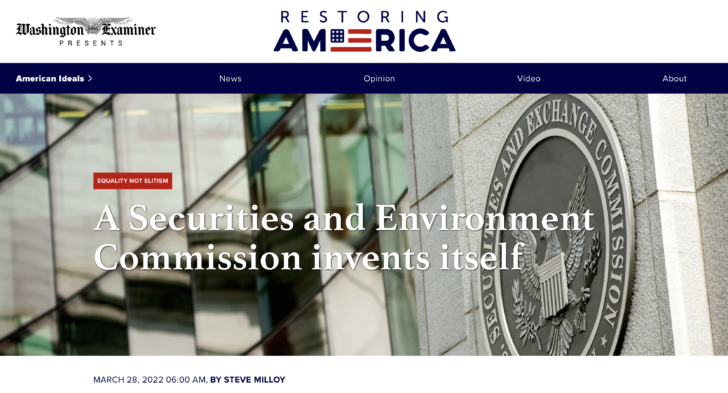My latest in the Washington Examiner (Web | PDF)

It’s called “global warming,” but the U.S. Securities and Exchange Commission seems to believe that it’s really “corporate warming.” Toward that end, the SEC just proposed new rules to compel publicly traded companies to disclose climate-related information to shareholders.
This proposal is so half-cocked that the SEC’s lone Republican commissioner, Hester Peirce, mocked the agency as aspiring to become the “Securities and Environment Commission.”
Established by Congress in 1934 amid the Great Depression to rein in some of the Wild West-like corporate practices that contributed to the 1929 stock market crash, the SEC was originally chartered to regulate corporate financial disclosures and trading markets so as to prevent securities fraud. And that’s it.
But that changed during the climate activist Obama administration, which tried to use the SEC pressure companies into supporting its climate agenda. In 2010, the SEC expanded without congressional authorization the existing disclosure framework to force companies into make special, albeit relatively easy to satisfy, climate-related disclosures.
These disclosures included risks posed to companies from climate-related government regulation and from global warming itself. None of this was necessary because publicly traded companies were already required to disclose all material information to shareholders regardless of subject matter.
Not only did the Obama SEC rules fail to advance its climate agenda, but they were actually hijacked by cynical and “woke” corporations that turned climate disclosures into marketing opportunities. They flooded investors with meaningless, if not bogus but politically correct, climate-related disclosures and claims, often referred to as “greenwashing.”
Now in 2022, the climate agenda is still struggling, especially given the 2021-2022 global energy crisis as exacerbated by the Russian invasion of Ukraine. So now comes the Biden SEC to try again to whip corporate America into bowing to the climate agenda.
The SEC’s 506-page proposal is far more complex and onerous than the existing Obama rules. No longer can a company simply disclose in free form how it imagines climate regulations or bad weather might conceivably affect its business. Instead, companies will be required to have independent certified auditors, think climate accountants, attest to the veracity of the new corporate disclosures.
During the meeting announcing the proposal, Peirce mocked the SEC by turning off her video to “reduce the carbon footprint of her presentation by 96%.” She then unleashed an extensive criticism of the proposal.
Peirce noted the SEC lacks the legal authority to propose the rules. Congress only gave the SEC authority to protect investors, facilitate capital formation, and foster fair and orderly markets.
Congress, Peirce noted, “did not give [the SEC] plenary authority over the economy and did not authorize [the SEC] to adopt rules that are not consistent with applicable constitutional limitations” regarding compelled speech.
She also pointed out that existing disclosure rules already cover any climate disclosures that are material and should be made to investors. These are showstopping points by themselves, but there’s more.
Existing SEC disclosure rules generally require that information be “material” or important to investors, where material means relevant to financial performance. But the proposed climate disclosures jettison the materiality requirement. Climate disclosures must be made whether they are material or not.
A company may even have to disclose its customer’s emissions if they are deemed “material.” But there is no rule for what “material” means. Instead, the SEC arrogantly informs corporate managements that (expensive) “climate consulting firms” will be able to help make those determinations.
Peirce said the SEC is underestimating the costs of the proposed disclosure regime and likened it to the sinecure given accounting firms by the Sarbanes-Oxley Act, which was passed in the wake of the 2008-2009 financial meltdown. But at least the Sarbanes-Oxley Act was authorized by Congress.
One overriding point that Peirce missed is the reality that the entire United States is responsible for only about 14% of global emissions, an ever-shrinking percentage as the rest of the world, think China and India, develop and emit more. Even if the entire U.S. stopped emitting today and forever, 86% and ever-more of global emissions would still occur.
So regardless of how one feels about what passes for United Nations climate science, pretty simple math shows that U.S. corporations alone cannot possibly significantly affect the climate by cutting emissions.
I have tried to get this point across to the SEC before. In 2019, I petitioned the SEC to amend its Obama-era rules so that corporate discussions about emissions must be in the context of global emissions. Today, a company may, for example, tout that it is “saving the planet” by cutting its emissions by, say, 25 million tons per year. While that may sound like a lot, global emissions are at about 65 billion tons and growing. So 25 million tons is not really significant or “material.”
Finally, the SEC doesn’t even really know what it is talking about with climate. The SEC said a company “might also set a goal of achieving net zero greenhouse gas emissions across its operations by 2050, in keeping with the goals of the Paris Agreement.”
But the Paris Agreement’s climate goals are specific global temperature targets that have nothing to do with corporate emissions. Moreover, the Paris Agreement signatories were nations, not corporations. There is nothing a corporation can do to “keep with the goals” of it.
If the proposal is finalized, it will almost certainly be struck down by the Supreme Court as the SEC exceeding its legal authority. Instead of wasting everyone’s time and money, the commission should withdraw the proposal, forget about “saving the planet,” and go back to its congressionally authorized mission.
Steven Milloy publishes JunkScience.com and is a former attorney with the U.S. Securities and Exchange Commission.
Once again, weaponizing a government agency against real science and rational thought to support an idiotic agenda whose goal is more and more micromanaging of the economy and our lives.
I am so tired of this sort of thing.